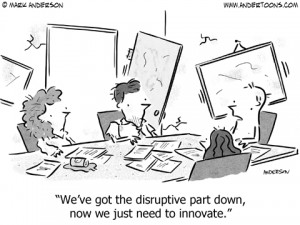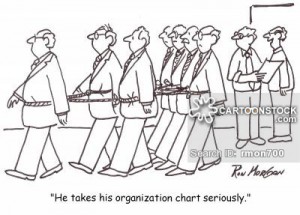-
Erin E Hall wrote a new post on the site Public Service Project 9 years, 9 months ago
http://www.phillymag.com/news/2013/02/05/dirty-philadelphia-trash-problem/
Travel and Leisure Magazine ranked Philadelphia as 6th of America’s Dirtiest Cities in 2012, which is a only slight improvement […]
-
Erin E Hall commented on the post, Happy Birthday SNL // the typists from the Carol Burnett show, on the site 9 years, 9 months ago
I think that there’s a negative stigma with consumers about facial recognition software. I know there was a lot of backlash when Facebook introduced it for pictures, and I wouldn’t be surprised if the same thing happened with Windows 10. Regardless of whether this is able to increase security, I think consumers will think that this type of…[Read more]
-
Erin E Hall commented on the post, Happy Birthday SNL // the typists from the Carol Burnett show, on the site 9 years, 9 months ago
I think I prefer qualitative questions like in Deloitte’s new approach. Putting a numerical value on someone’s performance can sometimes be really difficult, and the evaluator would therefore waste their time trying to quantify their performance, even though they know in their head exactly how they performed. I also think the feedback would be…[Read more]
-
Erin E Hall wrote a new post on the site MIS4596 – Section 3 Spring 2015 9 years, 9 months ago
I thought this article was interesting, especially in light of the discussion of performance reviews yesterday. It looks at a few different companies and their initiatives toward creating completely honest and transparent workplaces. A survey by 15Five indicates that 85% of employees are unsatisfied with the quality of communication at work. On top of this, 81% of full-time U.S. employees would rather join a company with open communication over companies that offer perks such as top health plans and gym memberships.
New York Computer Help
-Joe Silverman (Owner) says “Our motto is total transparency, and I strive to promote this from the staff level through the customer.” Silverman enforces this by dismissing employees on the spot who start to cut corners, or withhold information from customers.
-This honesty is also important in terms of training: “Any time a repair comes in, we ask who hasn’t done this before. Whoever says no gets a crash-test training how to do it.”
Quirky
-Chief People Officer Rochelle DiRie distinguishes between transparency and honesty by saying “Transparency is the surfacing of data and events; honesty is about your interpretation and desires.”
-Both transparency and honesty are strongly enforced at Quirky from senior management down, and are also included in the company’s core values. This mentality also includes never hiding bad news. “We ask our employees to always state their opinions, even if controversial.”
How important do you guys think honesty and transparency in the workplace are? Are there scenarios where withholding bad news is the better choice?
-
Honesty and transparency are very important in the workplace as long as the feedback is objective. Additionally, the feedback should be distributed in such a way as not to raise emotions so those providing the feedback should be careful about their tone during communications.
The only time I can see withholding bad news as being the better choice is when the employer is trying to collect the amount of mistakes an employee makes to make a case for firing the employee. I believe employees should actively seek feedback from superiors so that there is less surprise when reviews are issued where companies are not transparent. -
I think honesty and transparency are vital in the workplace. From my experiences at my internships and talking with business professionals, people want the whole truth. If a coworker feels that someone isn’t being honest about a situation or is omitting particular details in the workplace, the level of trust between those two will decrease to the point where one or both parties involved no longer have trust, making it hard to get work done. This also applies when dealing with clients, if a client believes you’re not being transparent and honesty you will most likely lose their business. I actually witnessed this first hand at one of my early internships. My one boss continually finished projects late for a variety of reasons and wouldn’t be completely transparent with the client. Once clients started catching on, many didn’t do business with him anymore. Overall, not being completely honesty and transparent with people in the workplace will only cause problems down the line.
-
-
Erin E Hall wrote a new post on the site MIS4596 – Section 3 Spring 2015 9 years, 9 months ago
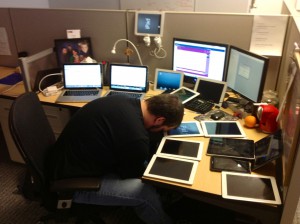 As MIS majors, understanding the value of new technologies and being able to adapt to them is something that we take for granted. However, within the workplace there is often complacency among employees with existing technology and even hesitancy/fear to acquiring new products and systems.
As MIS majors, understanding the value of new technologies and being able to adapt to them is something that we take for granted. However, within the workplace there is often complacency among employees with existing technology and even hesitancy/fear to acquiring new products and systems.https://hbr.org/2015/03/convincing-skeptical-employees-to-adopt-new-technology
In a study by MIT Sloan Management Review, 63% of managers said that the pace of technological change is too slow, due to a lack of urgency and poor communication of the benefits of new tools. Rebecca Knight of Harvard Business Review offers managers some advice for overcoming these obstacles with their employees:
1) Choose Technology Wisely: Bear your teams interest in mind. “Functionality is critical, but so is user-friendliness.”
2) State Your Case: Put forth a compelling vision of what the technology is and what it’s going to do.
3) Customize Training: Training efforts should reflect differences in familiarity and interest in technology; don’t be afraid to ask them what they want in a training.
4) Get Influencers Onboard: Create a “Network of Champions” fully invested in the new technology.
5) Make it Routine: “Implicity raise the cost of not using the new technology,” so they’re pushed towards routinely using the new tools.
6) Highlight Quick Wins: Draw attention to positive impacts.
7) Make it Fun: Reward the behavior you want to see (i.e. compensation, perks, recognition etc.)
8) Consider Penalties: Possibly penalize resistors for non-use.
-
Erin E Hall commented on the post, Happy Birthday SNL // the typists from the Carol Burnett show, on the site 9 years, 10 months ago
I agree with Mohamed that some companies will be more innovative than others, and that directly depends on their culture. However, even though Steve Jobs didn’t intend to redefine the music industry, that’s because it’s really difficult to determine if a product is going to be successful when the general public doesn’t even know they need it. He…[Read more]
-
Erin E Hall commented on the post, Happy Birthday SNL // the typists from the Carol Burnett show, on the site 9 years, 10 months ago
I think Project Ara definitely has the potential to be a disruptive innovation for smartphones. I think after 6 generations of iPhones, some of the common issues, such as the planned obsolesce of operating systems and hardware malfunctions (cracking the screen), are starting wear on dedicated iPhone customers. Project Ara offers a solution for the…[Read more]
-
Erin E Hall wrote a new post on the site MIS4596 – Section 3 Spring 2015 9 years, 10 months ago
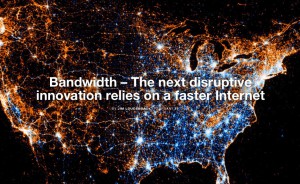
http://www.technobuffalo.com/2015/02/28/bandwidth-the-next-disruptive-innovation-relies-on-a-faster-internet/
In this article, Louderback talks about how increasing bandwidth over the past few decades has disrupted different forms of media. The disruptions he discussed were:
1. Printing Publications
2. The Music Industry (disrupted by Napster, LimeWire, etc.)
3. Cable TV Companies
4. The Film Industry
However, now that we have the bandwidth capacity for accessing/streaming all of the traditional forms of media, Louderback identifies a couple trends of what new forms of media may be disruptive in the near future:
-Immersive Virtual Reality
-Personal Streaming (as seen in early experiments with SnapChat)
-Augmented Reality (Microsoft’s HoloLens)
But beyond these predictions, Louderback believes that the next disruptive media innovation may not have been invented yet. Do you guys agree with the trends that Louderback identified? Or do you have any other ideas on what new media disruptions might appear in the next decade? -
Erin E Hall wrote a new post on the site MIS4596 – Section 3 Spring 2015 9 years, 10 months ago
http://www.cio.co.nz/article/565828/lesson-disruptive-innovation/
Jon Rice and Sean Walters were able to take the concept of disruptive innovation and apply it to the recruitment industry (which they said […]
-
Erin E Hall wrote a new post on the site MIS4596 – Section 3 Spring 2015 9 years, 11 months ago
http://washingtontechnology.com/articles/2015/01/15/insights-davis-new-corporate-structures.aspx
By removing these “old fashioned” structures, companies:
1) Can spark innovation among employees who no longer feel confined by their organizational role.
2) Create more informal network relationships across organizational boundaries.
3) Distinguish themselves from competitors.
This article argues that old-style, hierarchical organizational structures are detrimental to technological companies. “It creates a straight jacket that makes organization adaptability to changes in the market impossible.” The argument is that the inflexibility of a rigid corporate structure creates a “straight jacket” for firms’ innovation, because employees are always consumed by the operations within their business unit.
Davis also argues that these organizational structures prevent network relationships across organizational boundaries. Creating incentives/rewards for this kind of communication needs to be available to drive cooperation.
Lastly, Davis points out that if all companies have a hierarchical organizational structure, that it is not distinguishing itself from its competitors. A person at Firm A can quit and start working a similar position at Firm B the next week, and would need minimal training because the systems/processes across these organizations are almost identical.
-
Erin E Hall wrote a new post on the site MIS4596 – Section 3 Spring 2015 9 years, 11 months ago
This article suggests two pieces of advice for inattentive supervisors:
1) Take Charge- Set up a weekly or biweekly meeting with your boss in advance.
2) Find Feedback Elsewhere- Seek advice from experienced coworkers.
Personally, I think this article is terrible. If your only attempt for reaching out to a supervisor (before giving up and asking someone else) is setting up a meeting, then you’re probably going to end up disappointed. The whole reason you can’t meet with your boss is because (s)he doesn’t have enough time- so why would set up a meeting to take up more of his/her time?
A boss without any spare time is a perfect scenario to employ the skills we learned by doing elevator pitches. Utilize the time that they spend riding in elevators, taking the bus, walking to work etc.. That way, you’re not taking up more of their time, you’re just filling in the free space in which they really can’t do anything except stand/walk.
-
I think that employees should be careful in choosing whether or not to engage their boss in work-related conversation in their boss’s free time. Bosses with packed schedules may only have brief periods of time to themselves: quick walks through the office, elevator rides, and (possibly) lunch breaks. Encroaching on these times may sour your boss’s opinion of you; he or she may see you as someone who disrespects traditional methods of supervisor engagement and imposes on others at inappropriate times. Trying the same tactic with another boss, contrarily, might be commended for its boldness and deemed totally appropriate. Thus, it is important to know your boss’s receptiveness to impromptu meetings prior to attempting one.
-
-
Erin E Hall changed their profile picture 9 years, 11 months ago
-
Erin E Hall wrote a new post on the site MIS4596 – Section 3 Spring 2015 9 years, 11 months ago
In class this week, we talked a lot about the internal structures of organizations, but what about the geographic location of it’s headquarters? We know that some sort of distribution is necessary to create redundancy (safety) for company data, but where companies locate it’s central “hub” is completely up to them.
http://www.lasvegassun.com/news/2015/jan/26/next-silicon-valley/
In this article, it discusses the prospect of Las Vegas becoming the new Silicon Valley. The article states that there is 6 major factors that will either make or break Vegas’ future:
1) Education
2) Connectivity
3) Financial
4) Transportation
5) Culture
6) Tony Hsieh’s Downtown Project
With a lost cost of living, cheap travel, a plethora of tech start-ups and a world-renowned reputation (whether good or bad), do you guys think that Las Vegas has the potential to become the next big technological hub?
-
Silicon Valley is the next Silicon Valley. There is simply no alternative.
Las Vegas is not a city that white collar workers will want to live in. We talked about Iowa in class and how no one would want to go there for work, it’s almost the same thing with Las Vegas. If you have the talent, you will be going to Silicon Valley. If you don’t have the talent, you might consider Las Vegas, or the plethora of other cities claiming to be the next Silicon Valley.
What Tony Hsieh is doing is admirable and it’s been mildly successful, but no city in the United States will be the next Silicon Valley, unless it somehow falls off the face of the earth. -
Years ago if you wanted to start a tech company Silicon Valley was your only option because that is where all the tech people were. Today, many cities around the US and around the world have thriving start up communities, many of which as moving up trying to take Silicon Valley’s place at the top. I am not, however, convinced that Las Vegas is the city that will do it. In my mind when I think of Las Vegas I think of somewhere you go to visit, not somewhere you live. It does not have many of the attractions other cities have and has a relatively bad reputation. Even if you wished to live in the suburbs and commute, as many people around other cities do, then you are living in Navada, which makes me thing of the desert and nothing else. If any city was going to overtake Silicon Valley I would look towards Seattle, which already has many successful tech companies with headquarters there. With a cost of living only slightly more expensive than Las Vegas but a much more positive reputation I would be much more likely to move there. Silicon Valley is an incredibly expensive place so I can see another area taking over as the hub of the tech world, I just don’t think Las Vegas is that place.
-
Personaly, I don’t think Las Vegas has the potential to become the next technological hub because when I think of Vegas I think of a vacation spot that people go to for a few days. There is not much to do in Las Vegas other the entertainment and I don’t think professionals would want to live there. It may be cheaper but I don’t think it would have a positive turn out. I agree with Amanda’s comment; I can see where another area can take over as the tech world but not Las Vegas.
-
-
Erin E Hall commented on the post, ICE 5.1 Telling a Story through Visualization, on the site 9 years, 11 months ago
I think what I found most interesting about this case is that the CEO and other higher-ups in the corporation (like Oliver Gariepy) were able to see the advantages of implementing IT systems and delivered that message very clearly to their employees. The thought of implementing an SAP system into a moving circus sounds almost sounds ridiculous…[Read more]
-
Erin E Hall commented on the post, NIST 800 60 V1R1 Guide for Mapping Types of Information and Information Systems to Security Categories, on the site 9 years, 11 months ago
I think that this type of organizational structure has to match the company’s culture. For the Valve Corporation, I think it’s a perfect fit because they are innovative and working on different aspects of the project helps spark a lot of creativity for them. I would be interested to see if Valve employees tend to chose the same/very similar…[Read more]
-
Erin E Hall wrote a new post on the site MIS4596 – Section 3 Spring 2015 9 years, 11 months ago
Africa: What Can Evaluators Learn From Complexity Science and Systems Thinking?
For the past few years, I have worked at a non-profit legal services provider. When I was reading the article about systems thinking that we were assigned for this class, I couldn’t help but think that although the idea made sense for information systems, it would never work in the some industries (namely in the legal field). Given the experience that I have working with lawyers, I couldn’t picture them ever looking at a problem holistically instead of drilling into the details because they are all very process-thinking oriented.
However, this article kind of served as a counter argument to my thinking. Here are public policymakers that are using systems thinking to integrate economic, social and environmental growth into a single ‘map of development.’ I think it’s cool that they were able to use systems thinking despite the fact that there is probably a significant amount of constraints when writing public policy, including (I’m assuming) a pretty strict budget. This article proves that systems thinking can be applied virtually any industry if you are willing to shift your mindset.
-
I believe that systems thinking in the public sector is very crucial to its success because the public sector has problems whose solutions are not obvious. Since the public sector is supposed to proactively service the public and provide them with solutions, the public sector has to take into account many actors and has to help those actors see the “big picture”. Often times the issues that the public sector tackles are issues where an action affects the environment surrounding the issue. Thus, if the public sector does not use system thinking, it will lead to ineffective solutions.
-
I am going to jump off of what Andre said in regards to the statement “Often times the issues that the public sector tackles are issues where an action affects the environment surrounding the issue.” When thinking of Systems Thinking I can not help but think about Newton’s third law of physics “For every action, there is an equal and opposite reaction.” I find this to be the case in any line of work where you are providing a solution for customers, business’s, or a community. Like you said Erin, “systems thinking can be applied virtually any industry if you are willing to shift your mindset.” I believe this to be very true because no matter what the situation is the solution you come up with will effect more than just the issue at hand.
-
I agree that Systems Thinking can be applied to just about any industry, and to good use too. It’s imperative to be able to understand the interrelation between all actors and functions in a plan. If you can’t do this, then you cannot be certain what will happen. In the case of the public sector, I agree with Andre in that it would greatly benefit from a Systems Thinking approach. It’s very easy to think only about little parts of the bigger picture and try to get those parts to work, without much thought as whether it will work well with the rest of the system. One change in a part of the public sector can create changes in other parts of the public sector, and if no one knows what those changes are, then that can be a recipe for disaster. So while Systems Thinking is definitely more synonymous with IT, it is definitely well-suited for anything in which the solution has many interrelated parts and is not obvious.
-
-
Erin E Hall commented on the post, Progress Report for Week Ending, September 22, on the site 9 years, 11 months ago
I agree with James about the use of props. Especially in a professional setting, I think it would be very easy for props to become distracting. Either it’s going to make the discussion stray from the content, or it’s going to be such an obvious demonstration of what you’re trying to say that it’s also going to be ineffective. The only way to…[Read more]
-
Erin E Hall commented on the post, Progress Report for Week Ending, September 22, on the site 9 years, 11 months ago
I think this company has a lot of potential, I actually stumbled across a video about them a few days ago and I was impressed. They’re obviously pretty young which may have contributed to them getting their IPO out so late, but I think that will help them in the long run in terms of staying innovative. I see them having a lot of success with small…[Read more]
-
Erin E Hall wrote a new post on the site MIS4596 – Section 3 Spring 2015 9 years, 11 months ago
Problem: An overwhelming amount of trash/litter in different regions of Philadelphia.
Solution: We will work on building a platform that synchronizes volunteering efforts and provide individuals and organizations with an opportunity to make an impact on their city, through finding out what areas need the most help (we will focus on unlittering). We will crowdsource data by having individuals use their smartphones to geotag areas they think need the most work. Organizations/ individuals looking to do community service can go on our website or app and check a heat map that shows where help is most needed. We will build into the idea a social focus on the homeless population and how we can work with shelters to integrate them back into society through community service. -
Erin E Hall changed their profile picture 11 years, 10 months ago
Connect and innovate with an elite information systems program
Footer
MANAGEMENT INFORMATION SYSTEMS
Fox School of Business
Temple University
210 Speakman Hall
1810 N. 13th Street
Philadelphia, PA 19122
